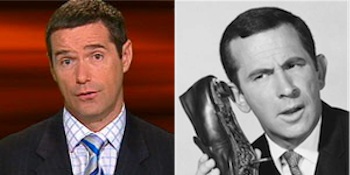
Of all the moments of frustration in last night’s SBS program Insight — and there were many — the most revealing was from host Jenny Brockie. After almost an hour debating Internet “filtering”, Brockie said, “I’m still unclear about whether it works or whether it doesn’t work, as a system.”
Thus begins my article in Crikey today — though it’s behind the paywall. If you’re not yet a subscriber (and why not?) you can get yourself a 21-day free trial. [Update: Things are only behind the Crikey paywall for 14 days, Click away!]
My key theme is that the reason no-one can agree on whether “the filter” will “work” is that no-one has defined exactly what it’s supposed to do — least of all the Minister, Senator Stephen Conroy.
“I have only ever identified [the material to be blocked as] Refused Classification in terms of child porn, bestiality, rape, incest sites, those sorts of things,” Conroy said last night. “For adults who want to be able to watch the other sort of material, we’re not proposing to do that. We’ve never proposed to do that.”
Except that, as the article details, the story has changed over time.
OK, this morning’s post about Senator Conroy being sacked was a little April Fools’ Day jokette. But with the continuing controversy over Internet censorship, the delayed National Broadband Network (though that finally gets an announcement of something or other this week), and yesterday’s gaffe about iiNet spying on its customers, could it soon be true?

I’m loving that point you made about Conroy obviously not wanting to be remembered for this. Interestingly, I got this print-out from the Wikipedia entry on the Australian Government of 2007-2010, that fell through a wormhole from a hundred years in the future. In the list of notable ministers and their contributions to the government, it said:
Kevin Rudd: no idea.
Julia Gillard: who?
Wayne Swan: buggered if I know.
Peter Garrett: wasn’t he a singer? Beats me.
Stephen Conroy: bastard who tried to destroy the internet.
Other ministers: not sure.
The article was marked as a stub though, so maybe someone could pop up to 2109 AD and edit it?
The thing that kills me is Conroy’s approach of “We don’t know what it is exactly we want to filter, but let’s figure out if we can filter it first”. Um. What.
On the plus side, there was very little of Bernadette and that ACL tool on the televised report. That’s a good thing for civil discourse.
@Eric TF Bat: There’s an idea for a nice article there, for publication on some suitable demi-anniversary of the election. That’d be June 2009.
@anthony: This is a point I do want to return to some time. If we don’t know, specifically, what we are doing, how the hell can we be conducting a “field test” or “pilot” of it? As iiNet has already pointed out, DBCDE wasn’t interested in a double-blind trial — which means the results likely to be unrepresentative.
Once again, it proves that despite the Rudd government’s oft-repeated mantra of “evidence-based policy”, they’re not actually interested in real evidence, just some bunch of numbers which they can cherry-pick and use in PR.
I’m still severely annoyed I didn’t make the shortlist to be on the show after giving the producer a lot of background material by phone. This was one of the worst Insight episodes – repetitive, poorly edited and far too deferential to the minister who waffled and could never give a straight answer to a straight question.
The only worthwhile contribution came from Fiona Patton for exposing the absurdity of a particular kind of content receiving a different classification based on the delivery format, eg being X18+ in print, but RC on VHS or DVD. This will never work for the web.
I like kink and it is easily available online. The suggestion clearly is that what is now available online will be denied to us in future. And the Classification board will soon have a staff of thousands… of conservative christian losers like Conroy who will criminalise media about harmless behaviour between consenting adults.